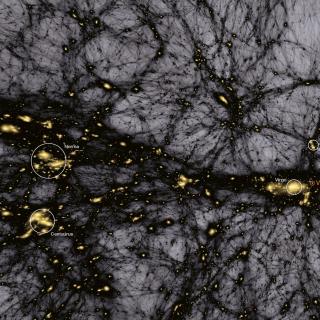Bibcode
Wang, Bao; Wei, Jun-Jie; Wu, Xue-Feng; López-Corredoira, Martín
Bibliographical reference
Journal of Cosmology and Astroparticle Physics
Advertised on:
9
2023
Citations
12
Refereed citations
8
Description
Fast radio bursts (FRBs) have been suggested as an excellent celestial laboratory for testing the zero-mass hypothesis of the photon. In this work, we use the dispersion measure (DM)-redshift measurements of 23 localized FRBs to revisit the photon rest mass mγ . As an improvement over previous studies, here we take into account the more realistic probability distributions of DMs contributed by the FRB host galaxy and intergalactic medium (IGM) from the IllustrisTNG simulation. To better account for the systematic uncertainty induced by the choices of priors of cosmological parameters, we also combine the FRB data with the cosmic microwave background data, the baryon acoustic oscillation data, and type Ia supernova data to constrain the cosmological parameters and mγ simultaneously. We derive a new upper limit of mγ ≤ 3.8 × 10-51 kg, or equivalently mγ ≤ 2.1 × 10-15 eV/c2 (mγ ≤ 7.2 × 10-51 kg, or equivalently mγ ≤ 4.0 × 10-15 eV/c2) at 1σ (2σ) confidence level. Meanwhile, our analysis can also lead to a reasonable estimation for the IGM baryon fraction f IGM = 0.873+0.061 -0.050. With the number increment of localized FRBs, the constraints on both mγ and f IGM will be further improved. A caveat of constraining mγ within the context of the standard ΛCDM cosmological model is also discussed.
Related projects

Cosmology with Large Scale Structure Probes
The Cosmic Microwave Background (CMB) contains the statistical information about the early seeds of the structure formation in our Universe. Its natural counterpart in the local universe is the distribution of galaxies that arises as a result of gravitational growth of those primordial and small density fluctuations. The characterization of the
FRANCISCO SHU
KITAURA JOYANES